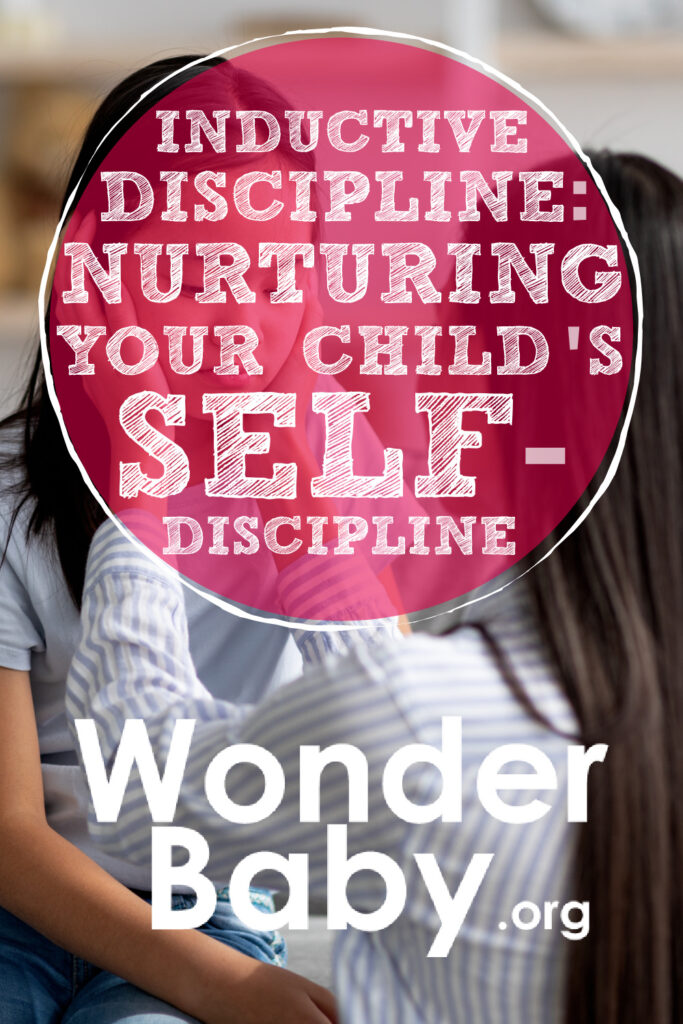Inductive Discipline: Nurturing Your Child’s Self-Discipline

- Inductive discipline encourages socially appropriate behavior and centers around children’s empathy and understanding.
- Inductive discipline acknowledges the belief that misbehavior often stems from underlying emotions and needs.
- Instead of resorting to disciplinary actions, inductive discipline aims to address the root cause of the behavior while encouraging accountability and self-awareness.
Nearly any parent who has yelled at their children has wondered if there is a better way to address a child’s behavior. Figuring out parental discipline is hard, especially if you want to implement natural and logical consequences.
As a parent, I always strived to have open conversations with my children about why I put specific rules in place in our home. Parents are the first teachers a child has in childhood, so it’s our job to positively influence our children’s behavior.
Children learn from our behavior, so you want to instill positive morals regardless of your parenting style. The reality is our children are the future, and it’s important we set them up for success by being a consistent positive influence in their life.
Inductive discipline has many benefits, including encouraging independence, supporting education, and promoting verbal communication.
There are many different types of parenting styles, so we aren’t here to tell you one method is better than another. Instead, we’ll fill you in on a parenting method with plenty of research to back it up.
What Is Inductive Discipline?

Inductive discipline focuses on guiding children through logical consequences, reasoning, and open communication. Parents who practice inductive discipline view discipline as a method of learning and growth rather than punishment.
American Psychologist Martin Hoffman focused his career on the development of empathy and its relationship with moral development. Hoffman, along with researcher H.D. Saltzstein, conducted a 1967 study assessing 7th graders and their moral development11. Hoffman, M. L., & Saltzstein, H. D.. Parent discipline and the child’s moral development. Journal of Personality and Social Psychology. 1967;5(1), 45–57. https://doi.org/10.1037/h0024189 and correlated the data with measures of parental discipline.
Prior research on the subject studied two discipline styles: power-assertive and love-oriented. Power-assertive discipline relies on force to control children, while love-oriented discipline relies on neglect.
A 1996 journal article, “Parents’ Use of Inductive Discipline: Relations to Children’s Empathy and Prosocial Behavior,” detailed Hoffman’s theory, stating that children of inductive parents22. Krevans, J., & Gibbs, J. C.. Parents’ use of inductive discipline: relations to children’s empathy and prosocial behavior. Child development. 1996;67(6), 3263–3277. https://pubmed.ncbi.nlm.nih.gov/9071781 were more empathetic, and more empathic children were more prosocial.
Hoffman theorized there were three types of parenting: induction, power assertion, and love withdrawal. However, inductive parenting reigned supreme amongst the rest because of the positive outcomes in children.
Generally, a child with empathy has an easier time understanding and sharing the feelings of others.
What Does Inductive Discipline Look Like?
One of the most essential aspects of inductive discipline is explaining to your children why you have specific set rules. For example, if your teenager has a curfew, tell them why you want them home at a particular time instead of placing restrictions without explanation.
Your reasoning doesn’t have to be complicated; saying it’s dangerous to stay out late is a valid reason to stay on curfew.
Inductive parenting focuses on being flexible and adaptive rather than on negative consequences and physical punishment.
For example, a 2013 study by Choe et al. published in Developmental Psychology suggests that physically disciplined children are at an elevated risk for externalizing problems33. Choe, D. E., Olson, S. L., & Sameroff, A. J.. The interplay of externalizing problems and physical and inductive discipline during childhood. Developmental Psychology. 2013;49(11), 2029–2039. https://doi.org/10.1037/a0032054.
The study also suggested that mothers who endorse more inductive discipline by age 3 reported less physical discipline and had children with fewer externalizing problems at age 5 and a half.
The American Psychological Association (APA) Dictionary of Psychology44. American Psychological Association. Apa Dictionary of Psychology. American Psychological Association. (n.d.). https://dictionary.apa.org/externalizing-internalizing defines externalizing behavior as actions in the outside world, like acting out, antisocial behavior, hostility, and aggression.
How Does Inductive Discipline Differ From Deductive Discipline?

Inductive and deductive discipline vary greatly, mainly since the latter teaches children to determine the rules by seeing how their behavior is punished or rewarded.
On the other hand, inductive discipline techniques can help reduce power struggles and other forms of negative interaction around discipline.
Here’s a breakdown of the difference between the two parenting styles:
| Inductive Discipline | Deductive Discipline |
| Promotes growth and learning through forms of discipline | Rules are created and enforced with punishments and rewards |
| Invites the child to explain why they did what they did | Few clear explanations for rewards or punishments |
| Encourages empathy and prosocial behavior | Punishments may come across as arbitrary instead of natural |
| Parents focus on child development through positive expectations | Could potentially lead to an increase in anger |
Benefits of Inductive Discipline for Child Development

There are many potential benefits of inductive discipline for your child’s development, such as:
Fewer Deliquiences and Behavioral Problems
If you have a strong-willed toddler, instilling inductive discipline can help reduce behavioral problems. In addition, setting clear rules for your kids leads to positive behavior and less disruptive behavior.
Inductive discipline teaches your child to behave as expected without the use of physical or verbal punishment.
Higher Academic Performance
When parents have expectations about their child’s education and the importance of school, children are more likely to succeed in and out of the classroom. Simply put, a child’s behavior and education are closely connected.
In addition, children are more likely to develop self-discipline, leading to better performance in school.
Promotes Prosocial Behavior
Kids who practice prosocial behavior engage in voluntary behavior that benefits others and see other people’s thoughts and feelings as important.
Developing more prosocial behavior leads to a focus on positive activities like volunteering, helping a neighbor, or donating to a charity.
Helps Develop Critical Thinking Skills
A child’s actions at a young age significantly impact their critical thinking skills, and this includes nurturing inductive reasoning.
Inductive reasoning is a method where general conclusions are attained through inference from evidence. It also relies on verbal communication, allowing parents to act as external regulators.
Encourages Strong Moral Values
Strong moral values help build positive character traits in kids, including respect, kindness, humility, and compassion.
In addition, teaching children that manners matter is a positive use of inductive parenting and encourages strong moral values. Learning manners is important for children, whether it’s at school or home.
Nurtures Emotional Independence
Inductive discipline encourages children and students to recognize and understand their own emotions and the emotions of others. Emotional independence leads to a greater belief in yourself, which helps develop self-esteem.
By engaging in open dialogue, actively listening, and validating their feelings, children learn to manage their emotions effectively and develop empathy toward others.
Strengthens Relationships
Inductive discipline strengthens the bond between parents, teachers, and children by focusing on open communication. It establishes an environment of trust, respect, and understanding, fostering healthy relationships and mutual cooperation.
This positive dynamic promotes a sense of belonging and helps children and students feel secure and supported.
How to Effectively Use Inductive Discipline in Parenting

There are many ways parents can effectively use inductive discipline in parenting. As a parent, you influence your child’s life before they step foot in school, so it’s a great idea to plant the seeds of a positive upbringing at an early age.
While no parent is perfect, we can help our kids learn essential life skills that can significantly enhance the person they become.
Here are some tips on using inductive discipline in parenting:
- Start early, even if it takes time for your child to catch on.
- Use discipline for teaching, not punishment, allowing your child to make mistakes.
- Use reasoning to explain an inappropriate action; this helps teach your child how it can affect others.
- Practice communication and active listening to create an open conversation with your children as you implement inductive discipline.
- Explain the consequences of your child’s behaviors, so they understand what will happen if they don’t follow the rules.
- Aid your child in understanding how their behavior affects other people.
- Find age-appropriate ways to teach your child about inductive discipline.
- Practice role-playing to help develop your child’s social skills, which also helps engage problem-solving skills, communications skills, and creativity.
Inductive discipline also helps develop social conventions, the behaviors we engage in daily without constantly thinking about them. Social conventions include simple behaviors like shaking hands when meeting someone, saying “please” and “thank you,” making eye contact when talking with another person, and respecting personal space.
Many gentle parenting books suggest various parenting approaches, like positive reinforcement or natural consequences for a child. Remember, you’ll likely have different approaches to parenting depending on if they are toddlers and older kids.
A parent’s use of inductive discipline allows them to set boundaries while providing guidance.
To help a child understand inductive discipline, explaining why you choose specific disciplinary actions is a great idea. I believe in having open conversations with my kids, so they can better understand my reasoning.
Early childhood is a prime time to instill important life lessons that aid a child’s development. As parents, we have to decide which path we want to lead our children on.
FAQs
What should I do if my child doesn’t seem to respond to inductive discipline or continues to engage in challenging behavior?
Practicing patience when introducing something new to your children is always good. You may also want to change your approach and give them time to remember what’s expected. Remember, any stride they make in the right direction is progress.
How can I practice self-regulation and model empathy and understanding while using inductive discipline?
One of the biggest things you can do while introducing inductive discipline is to be a good role model. It’s not always easy as parents, especially if our kids aren’t listening, but they learn from our behavior.
It might not always come naturally, but it’s a good idea to be mindful of how you interact with others when your children are around.
What’s the difference between physical and inductive discipline?
Inductive discipline involves no physical punishment or consequences and is especially helpful if you are looking for alternatives to spanking. Physical discipline involves anything done to cause discomfort or pain in response to your children’s behavior.
References
- Hoffman, M. L., & Saltzstein, H. D. (1967). Parent discipline and the child’s moral development. Journal of Personality and Social Psychology, 5(1), 45–57. https://doi.org/10.1037/h0024189
- Krevans, J., & Gibbs, J. C. (1996). Parents’ use of inductive discipline: relations to children’s empathy and prosocial behavior. Child development, 67(6), 3263–3277. https://pubmed.ncbi.nlm.nih.gov/9071781
- Choe, D. E., Olson, S. L., & Sameroff, A. J. (2013). The interplay of externalizing problems and physical and inductive discipline during childhood. Developmental Psychology, 49(11), 2029–2039. https://doi.org/10.1037/a0032054
- American Psychological Association. (n.d.). Apa Dictionary of Psychology. American Psychological Association. https://dictionary.apa.org/externalizing-internalizing

Related Posts

Parenting
Sensory Wall Art: 5 Tips to Create a Room Your Blind or Low-Vision Child Will Love
Even if your child can’t see their surroundings, personalizing and decorating their room with thoughtful, sensory-friendly design can make a big difference in their confidence, independence, and joy.

Development, Special Needs
How to Track Milestones for Developmentally Delayed Babies
Parents of developmentally delayed babies can explore practical tools and strategies to track milestones, celebrate progress, and support their child’s unique developmental journey.

Fine and Gross Motor
5 Alternatives to Tummy Time for Babies with Motor Development Challenges
Does your baby struggle with tummy time due to motor development challenges? These alternatives to tummy time will offer the same benefits.